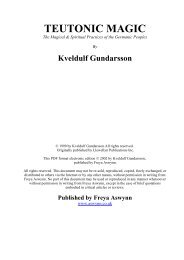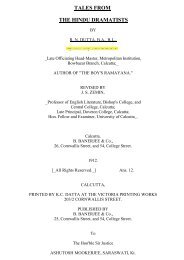Untitled - Awaken Video
Untitled - Awaken Video
Untitled - Awaken Video
You also want an ePaper? Increase the reach of your titles
YUMPU automatically turns print PDFs into web optimized ePapers that Google loves.
Chapter 5. The Underworld 139<br />
Modern psychologists have interviewed people who have endured near-death experiences<br />
rather extensively, and there are certain factors in these interviews which<br />
are quite common to most of them. The survivors report an increased passion for<br />
life in general, and a decrease in taking for granted simple things like health, and<br />
a sense of well-being. For the ancients, these things were gifts passed on through<br />
family lines, things such as luck, health, and prosperity. For them as well as for<br />
those who have faced death, these things were not simply part of being human nor<br />
were they birthrights; they were “gifts” handed up through the family lineages and<br />
were ”granted” by forces outside themselves. If these things were truly part of being<br />
human, then humans should have complete control over them, but the fact is “they<br />
do not.” The fact is that luck, health and prosperity can whither away slowly or,<br />
sometimes, very quickly with no rhyme or reason. The Hávamál says:<br />
“Better living than not living.<br />
Only the living know wealth.<br />
I saw fire blaze up in a rich man’s home,<br />
But death stood outside the door.<br />
I knew Fitiung’s sons when they had sheep in their folds.<br />
Now they carry the beggar’s staff.<br />
Wealth changes in the twinkling of an eye.<br />
It’s the most fickle of friends” 35<br />
Birthrights are meaningless when one is dead; they only apply to the Land of the<br />
Living.<br />
The idea that the ancient Germanic peoples lived in a world of illusion does not<br />
hold up well. Their worldview which contained otherworldly beings and an Underworld<br />
to which their sense of luck/ power was inextricably tied helped maintain<br />
some organization in a chaotic universe much the same as modern mathematics and<br />
quantum mechanics serve the 20 th century. By living out their ancient spiritual<br />
philosophy, they were able to access a passion for life which seems to be sorely<br />
missing in the 20 th century. They were able to tolerate changes theoretically at<br />
least, better than their modern counterparts because of no need to view “time” as<br />
a linear progression of events, and because of their worldview, were potentially able<br />
to access the wisdom that comes from having few, if any, illusions about their own<br />
mortality. In view of these arguments, it is difficult to tell who the “world of illusion”<br />
35 R. I. Page, Chronicles of the Vikings, pp. 141-142, 1995.
















